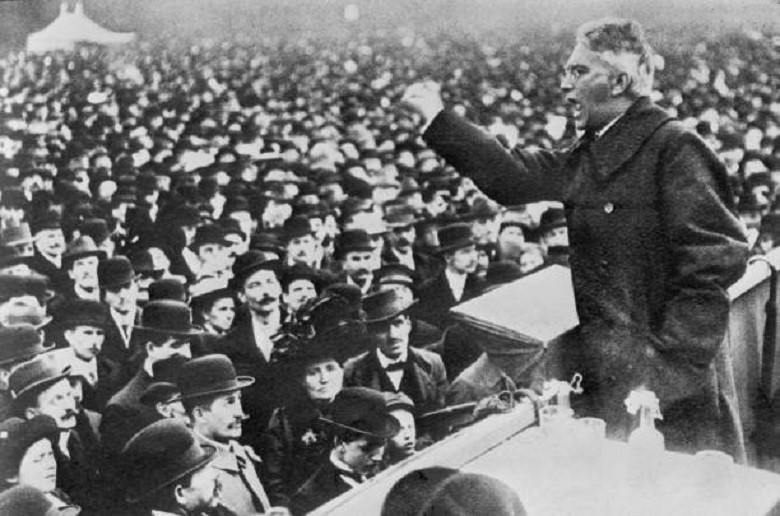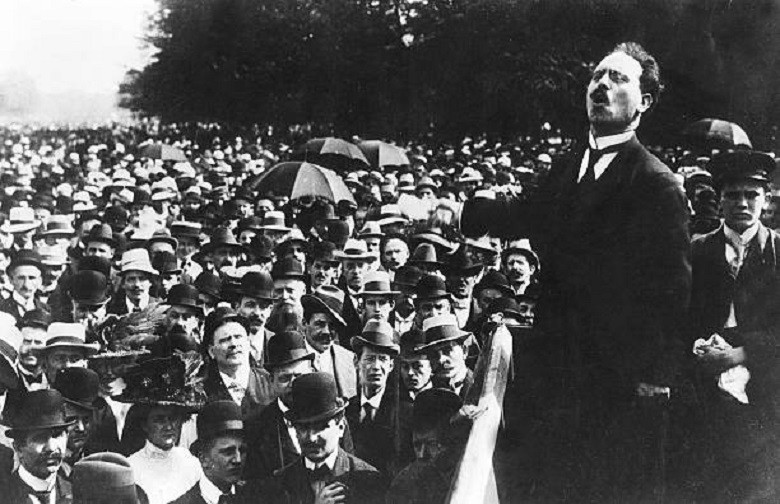
views
Karl Liebknecht: The Voice of Revolution and the Tragic Fall of the Spartacists in Germany (1918-1919)
The streets of Berlin, shrouded in the shadows of history, were charged with an electric atmosphere in the final days of World War I. The once-unthinkable idea of revolution was no longer a mere whisper in the hidden corners of the capital but a rising tide that would engulf everything in its path. It was the German Revolution of 1918, and Karl Liebknecht, a man deeply committed to the ideals of socialism, was at its center. A figure both revered and reviled, Liebknecht’s impassioned speeches would drive thousands into the streets, calling for an overthrow of the old order and the establishment of a new, more just society. But the journey from revolution to defeat was marked by bloodshed, betrayal, and the painful realization that even the most well-meaning movements could fall victim to forces they could neither control nor predict.

In the chaos of the revolution, Liebknecht’s actions and his voice carried the hopes of a generation. Yet, in the end, the Spartacist Uprising—the movement that Liebknecht co-founded—would lead to a tragic fall that set the stage for Germany’s future, deeply entangling the country in the tensions of the 20th century.
A Revolutionary Spirit: The Early Life of Karl Liebknecht
Born on August 13, 1871, in Leipzig, Karl Liebknecht was the son of the prominent social democrat Wilhelm Liebknecht, one of the founding fathers of the Social Democratic Party of Germany (SPD). From a young age, Karl was immersed in the world of politics. His father’s reputation as a staunch advocate for workers’ rights and social justice had a profound impact on Karl, shaping his political views and setting the stage for his future as a socialist revolutionary.
Liebknecht’s early education at the University of Leipzig and his later studies in law solidified his intellectual foundation. But it was the rise of militarism and the brutal imperialism that characterized Wilhelm II’s reign that ignited Liebknecht’s revolutionary fervor. His deep disillusionment with the Prussian aristocracy, the military elite, and the industrial capitalists led him to a life of political activism. He joined the SPD in 1900, believing it was the party best positioned to challenge the power structures in Germany. However, as the years passed, Liebknecht became increasingly dissatisfied with the SPD’s reformist stance and its willingness to support military actions during World War I.
While the SPD leadership was complicit in supporting Germany’s war efforts, Liebknecht emerged as a vocal anti-war critic. His position was one of deep pacifism and internationalism, arguing that the war was a fight that benefited only the ruling elite while devastating the working class. In 1914, when the SPD voted to support the war effort, Liebknecht was one of the few dissenters. He famously voted against war credits, an act that put him in direct opposition to his own party and alienated him from many of his colleagues.
The Spark of Revolution: The Collapse of the German Empire
By the end of 1918, Germany was on the brink of collapse. The Central Powers were losing the war, the German army was retreating on all fronts, and the working class was rising against the brutal conditions imposed by the war. The German Revolution began as a series of strikes, protests, and mutinies in the wake of the German defeat. The people, tired of the endless bloodshed, called for change.
Karl Liebknecht, alongside his closest ally, Rosa Luxemburg, saw the war as a symptom of a broader capitalist system that needed to be dismantled. In 1916, they co-founded the Spartacist League, a Marxist revolutionary group that believed in the necessity of a profound socialist revolution. This movement was determined to push the revolution beyond mere political reforms, aiming for the radical transformation of German society by toppling the entire capitalist system.
As the revolution erupted in Berlin in early November 1918, the people took to the streets, demanding the abdication of Kaiser Wilhelm II and the establishment of a republic. In the wake of the abdication of the Kaiser, a Council of Workers’ and Soldiers’ Deputies took power, and the Weimar Republic was born. However, the revolution was fractured, and the various factions within the socialist movement were at odds over how best to proceed. The SPD, now led by Friedrich Ebert, quickly consolidated power and negotiated with the military, seeking a peaceful transition to a republic.
But for Liebknecht and Luxemburg, this was not enough. They saw the opportunity for a deeper, more radical revolution—one that could break the old system of imperialism and capitalism once and for all. Their vision was one of a soviet-style government, a system where power was directly in the hands of the workers and soldiers.
Liebknecht's Revolutionary Speech: A Call to Arms
On December 5, 1918, Karl Liebknecht made one of the most iconic speeches of his life. Standing before a massive crowd in Berlin, he addressed the workers and soldiers who had come to support the revolutionary cause. His words were charged with the excitement and urgency of the moment, a moment where the entire future of Germany seemed to hang in the balance.
Liebknecht’s speech was not just a call for political change—it was a call for social transformation. He urged the crowd to take control of their own destiny, to seize power from the hands of the old elites, and to overthrow the provisional government that had been established by Ebert and the SPD. He denounced the new republic as a mere continuation of the old order, a government that sought to maintain the capitalist system and the military-industrial complex.
“We are not fighting for a change of rulers, we are fighting for a complete social revolution,” Liebknecht declared. He called for the establishment of a soviet republic, where workers’ councils would have direct control over the economy and the state. The crowd roared in approval, swept up by the fiery passion of Liebknecht’s words. For a brief moment, it seemed as though the future of Germany would be determined by the very people who had long been oppressed.
However, Liebknecht’s speech also marked the beginning of the end for the Spartacist uprising. While his call for a radical revolution resonated with many of the working class and soldiers, it also alienated key segments of the population. The SPD, backed by the military and conservative forces, responded with force.
The Spartacist Uprising and Its Tragic End
On January 6, 1919, the Spartacists took to the streets of Berlin in a general strike, hoping to mobilize the workers and soldiers for a final confrontation with the government. The uprising quickly turned into an all-out battle between the Spartacists and the government forces, which included elements of the military and Freikorps, a paramilitary group made up of former soldiers. The fighting was brutal, with hundreds of workers and soldiers killed in the streets of Berlin.
Despite their passion and conviction, the Spartacists were overwhelmed by the sheer military might of the government. The revolutionaries were scattered, and the leadership of the Spartacist League, including Liebknecht and Luxemburg, was captured. On January 15, 1919, both Liebknecht and Luxemburg were executed by Freikorps soldiers in the streets of Berlin. Their deaths were a devastating blow to the revolution and to the hopes of radical social change in Germany.
The Legacy of Karl Liebknecht
The German Revolution of 1918 and the Spartacist Uprising were ultimately defeated, but they had a lasting impact on the course of German history. Karl Liebknecht and Rosa Luxemburg became martyrs for the revolutionary cause, symbols of the struggle for a more just and egalitarian society. Their vision of a socialist republic would inspire future generations of revolutionaries, but their deaths also highlighted the deep divisions within the left and the brutal resistance to change from the forces of the establishment.

Liebknecht’s legacy, however, was not just about the failure of the revolution—it was about the idealism and passion with which he sought to challenge the entrenched power structures of his time. He had the courage to fight for a vision that he believed would transform Germany into a better, fairer place, even if it meant risking everything. His voice, though silenced by the forces of reaction, would continue to echo through the decades, inspiring new movements and struggles for social justice.
Conclusion
Karl Liebknecht’s role in the German Revolution of 1918 is a story of suspense, excitement, and tragedy. From his passionate speeches to his tragic death at the hands of his enemies, Liebknecht’s journey reflects the complexity and dangers of revolution. His call for radical change, his ideals of socialism, and his ultimate sacrifice continue to resonate in the annals of history as a reminder of the cost of challenging the established order.
Though the Spartacist Uprising was ultimately crushed, the revolutionary energy that Liebknecht and Luxemburg inspired did not vanish. Their legacy endured, influencing the future of German politics and contributing to the broader struggle for socialism and workers' rights in the 20th century.




















Comments
0 comment